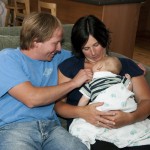Center on the Developing Child Harvard University
 Science tells us that experiences early in life may have long-term consequences for a child’s learning, behavior and both physical and mental health.
Science tells us that experiences early in life may have long-term consequences for a child’s learning, behavior and both physical and mental health.
Some types of “positive stress” in a child’s life (overcoming the challenges and frustrations of learning a new, difficult task, for instance) can be beneficial. On the other hand, severe, uncontrollable, chronic adversity (defined as “toxic stress” ) can produce detrimental effects on developing brain architecture as well as on the chemical and physiological systems that help an individual adapt to stressful events.
Read more »
 How a mother cares for her baby may determine her child’s future vocabulary and language abilities, regardless of a family’s economic status. Research shows that from a very young age, children are influenced by the way their mother’s verbally interact with them.
How a mother cares for her baby may determine her child’s future vocabulary and language abilities, regardless of a family’s economic status. Research shows that from a very young age, children are influenced by the way their mother’s verbally interact with them. May 12, 2008
May 12, 2008 The foundations of brain architecture are established early in life through a continuous series of dynamic interactions in which environmental conditions and personal experiences have a significant impact on how genetic predispositions are expressed. Because specific experiences affect specific brain circuits during specific developmental stages—referred to as sensitive periods— it is vitally important to take advantage of these early opportunities in the developmental building process.
The foundations of brain architecture are established early in life through a continuous series of dynamic interactions in which environmental conditions and personal experiences have a significant impact on how genetic predispositions are expressed. Because specific experiences affect specific brain circuits during specific developmental stages—referred to as sensitive periods— it is vitally important to take advantage of these early opportunities in the developmental building process.
 Patricia A. Cutspec, Ph.D.
Patricia A. Cutspec, Ph.D. The home literacy environment has an important role in young children’s emerging literacy and social-emotional development. An emphasis has been placed on storybook reading at home. However, it has been unclear how often (quantity) storybook reading should occur or how parents should interact (quality) with a young child while reading together. Results reveal the role that both characteristics (quantity and quality) play in young children’s (emerging) literacy development and the parent-child relationship.
The home literacy environment has an important role in young children’s emerging literacy and social-emotional development. An emphasis has been placed on storybook reading at home. However, it has been unclear how often (quantity) storybook reading should occur or how parents should interact (quality) with a young child while reading together. Results reveal the role that both characteristics (quantity and quality) play in young children’s (emerging) literacy development and the parent-child relationship. Science tells us that experiences early in life may have long-term consequences for a child’s learning, behavior and both physical and mental health.
Science tells us that experiences early in life may have long-term consequences for a child’s learning, behavior and both physical and mental health. New research shows the critical impact of a child’s “environment of relationships” on developing brain architecture during the first months and years of life. We have long known that interactions with parents, caregivers and other adults are important in a child’s life, but new evidence shows that these relationships actually shape brain circuits and lay the foundation for later developmental outcomes, from academic performance to mental health and interpersonal skills.
New research shows the critical impact of a child’s “environment of relationships” on developing brain architecture during the first months and years of life. We have long known that interactions with parents, caregivers and other adults are important in a child’s life, but new evidence shows that these relationships actually shape brain circuits and lay the foundation for later developmental outcomes, from academic performance to mental health and interpersonal skills.